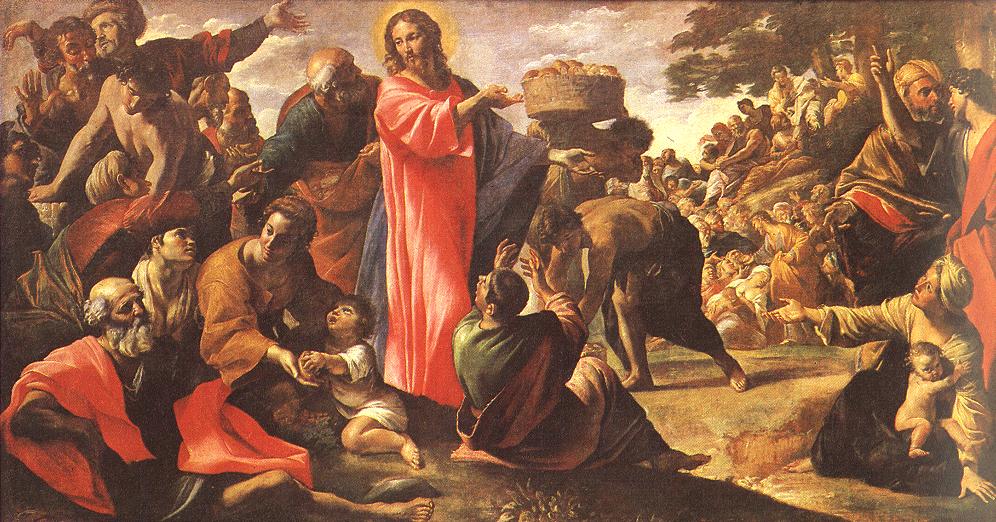The Forgotten Part of the Miracle

By Shawna Barnard
How do you respond to the loss of a friend or family member? How do you treat others when you are maligned? How do you react when circumstances are so busy that you’ve had no opportunity to eat? How do you handle the unexpected needs of others?
The human tendency is to retreat from God and others when circumstances like these come our way. When we’re grieving, actively thinking about how we can bless others is the last thing on our minds. When we’ve been sinned against, we become easily agitated—even by those who didn’t sin against us in the first place! When our duties require a non-stop schedule, extending compassion feels like a chore. When an unexpected opportunity to meet a need arises, we look the other way.
Our director at Rod and Staff Ministries, Jim Fain, frequently reminds us that it’s easy to love God and others when it’s seventy-two degrees and sunny, but it’s a lot harder when the storms come. Our counselees come to us when the storm is raging. How do we help them navigate these turbulent waters? Jesus Christ shows us the way.
Jesus’ feeding of the five-thousand is remembered because it was such a grand miracle, but the hard circumstances Jesus faced before he extended this act of compassion are easily forgotten. Understanding Jesus response to these events is most helpful for the counselor. We can discern at least four of the circumstances under which Jesus came to feed the crowd:
1. The death of John the Baptist: “And his disciples came and took the body and buried it, and they went and told Jesus. Now, when Jesus heard this, he withdrew from there in a boat to a desolate place by himself” (Matt 14:12-13a; cf., Mark 6:29, 30; Luke 9:10).
2. Herod’s pursuit of Jesus: “Herod said, ‘John I beheaded, but who is this about whom I heard such things?’ And he sought to see him (Luke 9:9; cf., Matt 14:1,2; Mark 6:16).
3. Rest for the disciples: “And he said to them, ‘Come away by yourselves to a desolate place and rest a while.’ For many were coming and going, and they had no leisure even to eat” (Mark 6:31).
4. The unexpected crowd: “But when Jesus heard this, he withdrew from there in a boat to a desolate place by himself. But when the crowds heard it, they followed him on foot from the towns” (Matt 14:13; cf., Mark 6:33; Luke 9:11;).
How did Jesus respond to these hard circumstances? When Jesus saw the crowds He served them—not begrudgingly—but with compassion. He welcomed them, cured their sick, and taught them about the kingdom of God. These accounts from Mark and Luke are marvelous:
“When he went ashore he saw a great crowd, and he had compassion on them, because they were like sheep without a shepherd. And he began to teach them many things” (Mark 6:34; cf., Matt 14:14).
“When the crowd learned it, they followed him, and he welcomed them and spoke to them of the kingdom of God and cured those who had need of healing” (Luke 9:11).
Wow! John the Baptist had died. If a precious ministry partner died, the world would tell me to go to my room to experience my feelings and cry for a while—a long while. Herod was pursuing Jesus. If somebody was antagonistic toward my ministry, the world would tell me to protect my ministry and myself at all costs and to not take time to teach and heal the crowd. Jesus and the disciples went away by themselves because the duties of the disciples had been non-stop. The world would have told the disciples to demand from Jesus their right to rest and be alone with Him. Jesus, however, didn’t dismiss the crowds after healing them. In Matthew 14:15 we read:
“Now when it was evening, the disciples came to him and said, “This is a desolate place, and the day is now over; send the crowds away to go into the villages and buy food for themselves. But Jesus said, “They need not go away; you give them something to eat.”
Personally, I would have thought healing and teaching the crowd was more than enough, but Jesus had other ideas. Jesus didn’t send the crowds away when the day was growing long and bellies were rumbling. Instead, He served them again. He fed over 5,000 of them with only five loaves and two fish, and they ate until they were satisfied! I would have said, “Crowd, I am really grieved by your hunger and saddened by your distress, but I can’t do anything about it right now. I am just too tired.” My compassion would have stopped there. Yikes!
How would we respond to similar circumstanes? Let’s think about that. Are we compassionate when when we hear the pitter patter of little feet coming to our door in the middle of the night? As we pull into the driveway after a long day at work, do we seek to meet the needs of the neighbor who approaches our car unannounced? If we have food to share, do we share it? Are we seeking to do good to do others rather than being distracted by those who are persecuting us? When a person who is dear to us dies, do we seek to minister to those around us?
Jesus’ kind of compassion compels care for another. He moves toward God and others, not away from them. He is living out the message of His ministry. Earlier he preached, “Whoever finds his life will lose it, and whoever loses his life for my sake will find it” (Matt 10:39). Jesus calls us not only to lose our lives when we experience loss and disappointment, but also to actively do good when we are being sinned against. In his first letter Peter writes, “Therefore let those who suffer according to God’s will entrust their souls to a faithful creator while doing good” (v. 19). Can we let the weight of Peter’s and Jesus’ words sink in for just a moment?
It really is hard to love God and others during the storm, but we are commanded to do just that.
If we want our counselees to know peace in turbulent waters, we would direct them to navigate those turbulent waters like Jesus did. Even when we are undergoing the worst of circumstances, suffering isn’t a catalyst for self-soothing, but for service of others and savoring of the Savior. Our souls would sing during the storm if we steered our boats like our Savior. Jesus said the way to living is through dying, the way to gaining is through giving, the way to receiving honor is through humility. Oh, that we would take His yoke, His burden, learn from Him, and enter His rest. To Him be glory forever.
